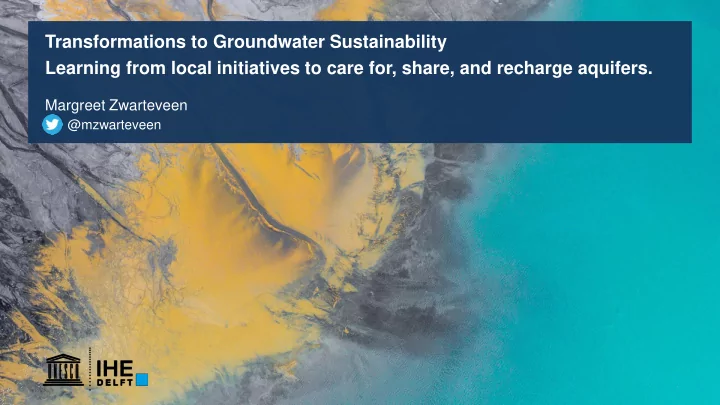

Transformations to Groundwater Sustainability Learning from local initiatives to care for, share, and recharge aquifers. Margreet Zwarteveen @mzwarteveen
Picture: Irene Leonardelli, 2019 2
Why is groundwater relevant? • Groundwater currently provides drinking water for about half of the world’s human population and irrigation water for 42% of the world’s irrigated lands. • In agriculture, the availability of groundwater has allowed the expansion of the agricultural frontier. Drawing by Stressdafrican www.hydrology.nl 3
International policy statements about groundwater • Stress strategic importance of groundwater for current and future water, food security and climate resilience; • Groundwater appears: – As a precious and untapped resource that can be harnessed for development, profit or as buffer against climate extremes – As a resource that requires (global) attention and actions because of rapid depletion 4
Groundwater governance Groundwater is notoriously difficult to govern: • Its invisibility makes it difficult to precisely know quantities and qualities • Tensions between individual and collective interests and between short-term gains and longer-term sustainability Drawing by Stressdafrican www.hydrology.nl 5
Current state of groundwater research • Takes ‘development’ (or agricultural intensification) as a given. • Dominated by scientific experts from fields such as engineering, hydrology and hydrogeology. • Dominance of a few international organisations (IWMI, FAO, World Bank, OECD, ICRAF) • Assumes that groundwater governance is a public affair and the responsibility of the state and public experts 6
Grassroots community-based initiatives 7
T2GS: The project’s hypothesis Hypothesis: identified initiatives of grassroots mobilisation around groundwater supplies contain essential insights about forms of coordination, care, and solidarity that can provide the basis for more harmonious – sustainable and just - ways of living with, and making use of, groundwater. 8 Picture: Dhaval Joshi
The importance of recharge • Recharge plays an important role in cementing local forms of collective care and solidarity. • Consist of creative ways of capturing rain- and surface-water to recharge aquifers. • Often based on long traditions of capturing water flows through wells and dams to store water for later use. 9 Pictures: Marcel Kuper
Our approach: joint learning: • Joint learning in each of the project sites, bringing together researchers with farmers, NGOs, government officials and others to start a conversation about – and experiment with – ways of using, accessing and sharing groundwater in sustainable ways. • Example: “The California Dream”, an imaginary of ‘making the desert green’ 10 Pictures: California T2GS team
How is COVID-19 shaping the research? • Crucial importance of the under-or unpaid labour of women and youth in creating forms of care, solidarity and resilience as well as their enormous precarity as farm workers. • The costs of the pandemic and groundwater extraction are deeply gendered. 11 11 Picture: M. Amine SAIDANI and Mostafa ACHELOUAW
Photo: Irene Leonardelli, 2019 12
Thanks t2sgroundwater.org 13 13
Recommend
More recommend